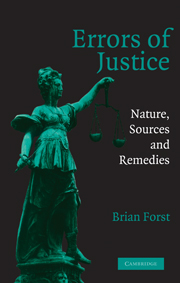Book contents
- Frontmatter
- Contents
- Preface
- Acknowledgments
- 1 The Problem
- 2 Errors of Due Process
- 3 Errors of Impunity
- 4 Frameworks for Analyzing the Incidence of Justice Errors
- 5 Assessing the Cost of Justice Errors
- 6 Standards of Evidence
- 7 Police-Induced Errors
- 8 Prosecution Policy and Justice Errors
- 9 The Jury
- 10 Sentencing and Corrections
- 11 Homicide
- 12 A Matter of Legitimacy
- Bibliography
- Index
- Titles in the series
9 - The Jury
Published online by Cambridge University Press: 05 July 2011
- Frontmatter
- Contents
- Preface
- Acknowledgments
- 1 The Problem
- 2 Errors of Due Process
- 3 Errors of Impunity
- 4 Frameworks for Analyzing the Incidence of Justice Errors
- 5 Assessing the Cost of Justice Errors
- 6 Standards of Evidence
- 7 Police-Induced Errors
- 8 Prosecution Policy and Justice Errors
- 9 The Jury
- 10 Sentencing and Corrections
- 11 Homicide
- 12 A Matter of Legitimacy
- Bibliography
- Index
- Titles in the series
Summary
In all criminal prosecutions, the accused shall enjoy the right to a speedy and public trial, by an impartial jury of the State and district wherein the crime shall have been committed, which district shall have been previously ascertained by law, and to be informed of the nature and cause of the accusation; to be confronted with the witnesses against him; to have compulsory process for obtaining witnesses in his favor, and to have the Assistance of Counsel for his defence.
— Sixth Amendment to the U.S. ConstitutionIntroduction
The American public episodically shows deep concern about jury errors. This concern emerges from time to time despite the relative rarity that an offender, even if arrested, will be held accountable for his criminal act before a jury: only 5 percent of all felony arrests end up in the judgment of a jury (Brown, Langan and Levin, 1999; Hart and Reaves, 1999). Public concern over jury errors is nonetheless legitimate, even if it derives principally from the handful of high-stakes jury trials that become public spectacles. These cases typically involve serious crimes; they serve as civics lessons. They shape what prospective offenders and criminal justice officials come to expect would happen, for better or for worse, should they find themselves involved in a jury trial. Regardless of the accuracy of these perceptions, the legitimacy of our criminal justice system is undermined when it is widely believed that juries are unreliable arbiters of guilt and innocence.
- Type
- Chapter
- Information
- Errors of JusticeNature, Sources and Remedies, pp. 134 - 149Publisher: Cambridge University PressPrint publication year: 2003



